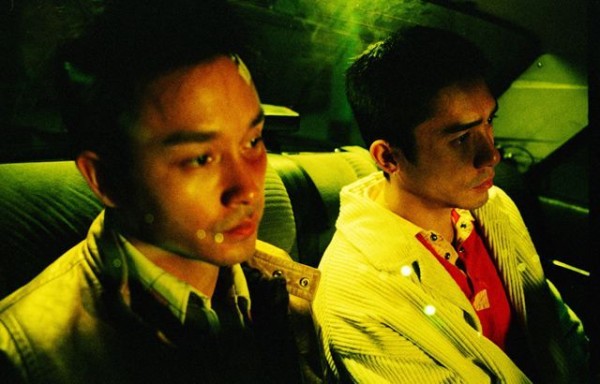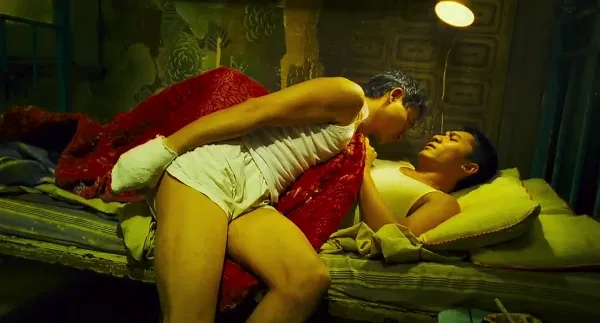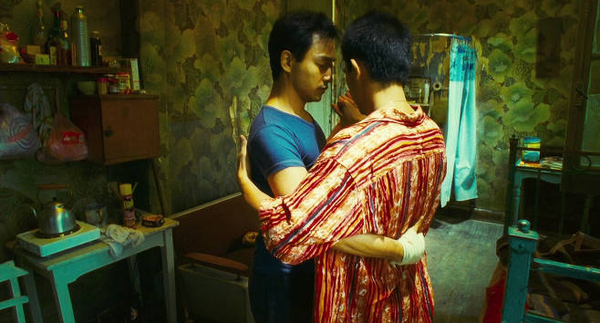Happy Together (1997). Roxie-BAM/PFA virtual retrospective in 4 K restorations.  LESLIE CHEUNG AND TONY LEUNG IN HAPPY TOGETHERLast tango in Buenos Aires - a new direction and new recognition
LESLIE CHEUNG AND TONY LEUNG IN HAPPY TOGETHERLast tango in Buenos Aires - a new direction and new recognitionThe earlier Wong Kar-wai films focused on romantic desire, longing, or frustration, loneliness or fleeting relationships.
Happy Together shifts to a couple who've been together a while and are having problems, but can't seem to split up for long. For this turbulent gay love story Wong boldly used Leslie Cheung and Tony Chiu-wai Leung, two of the biggest Hong Kong male stars (Leung definitely straight), showing them passionately making out on a little bed in the very first scene. And Wong reportedly shot that first scene first, rubbing the actors' noses in the unaccustomed gay subject matter (unaccustomed at least for Leung). Maybe to get that out of the way, as some have suggested; but it's not the last gay sex glimpsed on screen. In this film, though, the physical side isn't so much the point. It's the
emotional involvement of Po-wing (Cheung) and Yiu-fai (Leung) that counts. It's over but it's not over. It may have turned into nothing but care-taking and fighting, but the hold is as strong as ever.
The painfully back-and-forth of the relationship between sensuous, promiscuous Po-wing (Cheung) and responsible Yiu-fai (Leung) is underlined by the way Christopher Doyle's images shift back and forth between black and white and color. The scene-shifts are jerky; they jerk us around.
Wong Kar-wai temporarily avoided the issue of the 1997 Handover of Hong Kong to Chinese rule by shooting his 1997 feature abroad, in Buenos Aires, a location the director comfortably makes his own, even if his characters are aliens in it. The relentless, melancholy tango music of Astor Piazolla resounds throughout (and indeed, we get to see the principals tango together) - as does, later on, a Hong Kong rendition of the Turtles' song "Happy Together." Wong knew homosexuality would not fare well under the new regime so he took this last chance to make a film about that theme, treating gay love as a relentless "can't live with you, can't live without you" relationship that makes that title ironic.
Another irony is that Wong tones down his relationship with the brilliant, bold dp Christopher Doyle with a film of more straightforward (if still often gorgeous) images, and drops the fanciful double plot structures of his last two films in favor of the simple, linear one of the life abroad of three men (and no women). Yet somehow it's perhaps even harder for the viewer to get a foothold in this world that's so concretely depicted, in these scenes that are so simple, even as they evoke every turbulent relationship you may have ever had.
Yet the world is a concrete one of little shabby rooms. Wong's films have reveled in such rooms from the start, but never more tiny and shabby than the one Yiu-fai occupies after he and Po-wing break up - where Po-wing joins him after one brawl too many when he's helpless, with bandaged hands, jammed with a ghetto style crowd in the hallway below where people cook and there is the only phone. The lived-in quality of this setting reflects the extended time spent filming in Argentina, which was supposed to be brief but extended to four months.
Vivid also is the tiny tango bar where Yiu-fai works as a doorman in evening clothes, munching sandwiches or quaffing from flasks of liquor as he stands outside in the cold. It's here that Po-wing reappears by chance, arriving in cars with new male conquests or clients. As before, Leslie Cheung effortlessly exudes sensuousness and profligacy. Tony Leung is the orderly, hard-working one, but also a man who drinks and has a temper. We don't see what he does to end his employment at the bar, but it's violent.
One thing that threads the repetitious, believably going-nowhere narrative together is the couple's project, failed at the start, never abandoned, to visit a famous location, the Iguazu Falls, depicted on a cheap revolving lamp they had in the first tiny Argentine room, which Yiu-fai keeps. It's the objective correlative of the longing for a happy moment that can never be. But the real thread is the little room with the bed on one side and sofa on the other. When Yiu-fai is caring for Po-wing with the bandaged hands, they fight over who'll sleep on which. The secret is Yiu-fai never wants Po-wing to leave. All this is mostly from Yiu-fai's point of view. He thinks this is their happiest time. He hides Po-wing's passport.
After the tango bar Yiu-fai works in a kitchen. He becomes the only friend of a young twentyish Taiwanese guy, Chang (Chen Chang, who starred in Edward Yang's autobiographical
A Brighter Summer Day at fifteen). They drink together and the intuitive kid hears in his voice the sadness Yiu-fai denies. They seem happy playing ball with other Chinese kitchen staff outside the restaurant and it's Decenber, therefore summertime, which Yiu-fai says passes quickly. But not quickly enough: he takes another night job at a slaughterhouse to save money and avoid the now lonely room, for Po-wing has escaped. Apparently Yiu-fai and Po-wing are not going to meet again. Yiu-fai goes to see Iguazu and views the falls alone. Chang has left to visit an extreme southernmost point where he's promised to leave Yiu-fai's sadness. Po-wing enters the old room, empty of his lover now, and weeps. Lots of touching little details here. The friendship of Chang and Yiu-fai is heartbreaking.
This first Wong film about an established relationship is the loneliest and saddest but the most touching so far. This film brought Wong the greatest international recognition he'd yet had. Yet some Anglo critics dismissed it as too plotless. It arouses mixed reactions in me. It's not as fun as the earlier films, or as glorious visually - despite Doyle's ability to make the most ordinary locations evocative and fresh.
On the other hand, this is more about grown-up experience than what has come before. But I feel dissatisfied, as is Mike D'Angelo, who
has said Happy Together has all the elements he loves in Wong, the moody characters, lovely images, free structure, but irritates him by substituting the romantic yearning with endless squabbling. It's not quite that simple but that's kind of true nonetheless. As a gay person I have to be grateful for this movie from my cinematic idol, but I find Leslie Cheung more interesting in
Days of Being Wild, where he's central, than Tony Leung, who's the lonely, reliable guy who dominates here.
Happy Together 春光乍洩 (Chun gwong cha sit, "Bright spring," the Chinese title reportedly an allusion - ironic? - to the Handover), 98mins., debuted at Cannes in Competition May 1997, winning Wong the directing prize. Viewed on a screener of the 4K restoration "undertaken from the original 35mm camera negative by the Criterion Collection, in collaboration with Jet Tone Films, with l'Immagine Ritrovata and One Cool," approved by Wong Kar-wai. To be shown in a series of six 4K restorations of Wong Kar-wai films in virtual theater from Dec. 11 2020 by Roxie Theater and BAM/PFA.
 LESLIE CHEUNG AND TONY LEUNG IN HAPPY TOGETHER
LESLIE CHEUNG AND TONY LEUNG IN HAPPY TOGETHER  LESLIE CHEUNG AND TONY LEUNG IN HAPPY TOGETHER
LESLIE CHEUNG AND TONY LEUNG IN HAPPY TOGETHER





